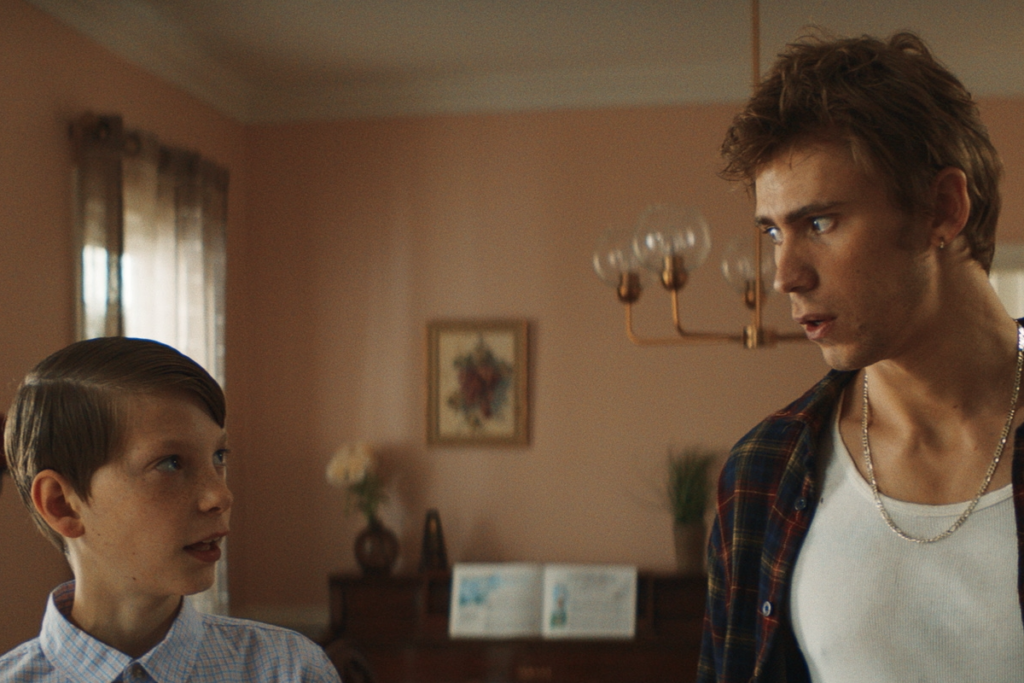A Star-Making Performance by Young Actor Everett Blunck Saves Coming-of-Age Comedy ‘Griffin in Summer’
First-time feature director Nicholas Colia’s biggest inspiration seems to have been ‘Welcome to the Dollhouse,’ the now-classic 1995 black comedy directed by Todd Solondz.

The eponymous character in the new indie movie “Griffin in Summer” is a precocious, at times imperious 14-year-old who would rather spend the sunny season indoors working on his play than lounging about the pool or biking around the suburb. Titled “Regrets of Autumn,” Griffin’s play is a hodgepodge of marital clichés, conventional flashbacks, and melodramatic turns, yet to the tween the work is extremely important, particularly as a stepping stone to his eventual career in New York City.
Griffin is adorably formal, amusingly exacting, and impressively determined in his attempts to get his play produced in the most professional manner his resources and small company of friends will allow. Yet when he meets a failed performance artist from Brooklyn, Brad, the teenager believes he’s not only found a fellow creative but a beau as well, leading to a summer in which real-life drama and misunderstanding beget maturity.
While intermittently entertaining, the film’s success lies almost entirely with lead Everett Blunck. With nary a consciously comic or cloying moment, the young actor takes Griffin as seriously as the character takes himself, even when his actions are absurd. It’s too bad, then, that the movie never rises to the level of Mr. Blunck’s acting, instead affecting a faintly ironic tone, neither decidedly satirical about youthful pretensions and suburban living nor humorously perceptive about growing up.
References to other “awkward teen” comedies like “Napoleon Dynamite” appear here and there, though first-time feature director Nicholas Colia’s biggest inspiration seems to have been “Welcome to the Dollhouse,” the now-classic 1995 black comedy directed by Todd Solondz. Indeed, the two films share so many similarities — such as the aloof hunk character and a sojourn to New York — that one wonders if Mr. Colia studied under Mr. Solondz while at NYU’s graduate film school. Unfortunately, the young director displays none of the professor/auteur’s eye and ear for detail, storytelling skills, or his compellingly caustic outlook, at least not yet.

Mr. Colia’s neglect of other characters beyond Griffin and Brad is one of the reasons why the film only occasionally comes to life as a coming-of-age comedy. Griffin’s little “troupe of players” includes four friends — each a nerdy theater kid — but we barely get to know them beyond their involvement in the play. It’s clear they band together out of a shared sense of ostracization from their Gen Z peers and social awkwardness, yet this theme goes ignored.
Griffin’s mom, Helen, is also neglected storywise, though Mr. Colia includes a scene in which his hero witnesses an argument over an extramarital affair between her and his absent father. The director plainly means to connect his parents’ problems with the topics of his playwriting, and this correlation proves both subtle and simplistic — basically unexplored. Still, actress Melanie Lynskey fulfills the role of the film’s only real adult with patient sensitivity, particularly in a late scene in which she tells her son that she cares for him more than her husband.
The focus of the story and, by extension, Griffin’s attention is Brad, and the director gives actor Owen Teague an appropriately movie star-like introduction after a few earlier scenes in which we glimpse the character indirectly. With Mr. Teague’s dreamy blue eyes and James Dean-esque countenance, it’s not difficult to understand why Griffin becomes infatuated with Brad, and Mr. Blunck’s adroit portrayal of incipient sexuality represents the film’s keenest observation.
The screenplay necessitates Mr. Teague depict Brad broadly — mostly high and drunk — and he certainly ups the ridiculousness quotient when we see one of the character’s performance pieces and when he replaces Tyler in Griffin’s play. The actor does manage, though, to infuse the role with vulnerability to contrast with the stock rebellious, dark demeanor.
The revisions Griffin makes to his play during rehearsals dovetail with the adolescent’s association with Brad, and the film makes a vague attempt to tie artistic development to growing social and sexual awareness. Yet snippets from the play provide only strained humor, with bad acting and trite, mock-shocking dialogue the extent of the joke. Hardly ever do these scenes and the film in general convey real wit, bite, or context, with scant droll moments addressing the boy’s thespian sensibilities and aesthetic interests.
In the absence of any artistic quandary on Griffin’s part, and with the dearth of interaction between him and the wider town, the film ends up a cutesy melodrama of unrequited love, a mild comedy of misinterpreted signals with an acerbic, instead of sentimental, look at immature dramaturgy left waiting in the wings. One thing it does do well, though, is shine a spotlight on a fantastic new actor, leaving one hoping Mr. Blunck’s next project furnishes him with an even better vehicle for his talent.

